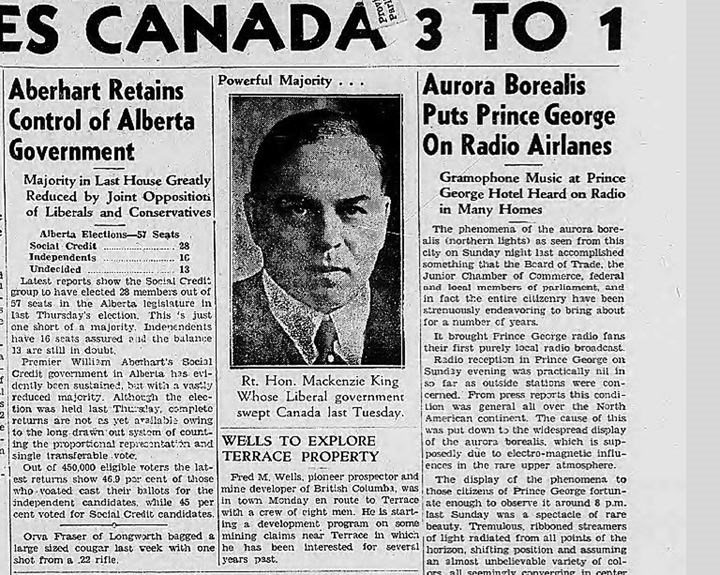This week in Prince George history, March 28 to April 2:
March 28, 1940: An unusual display of aurora borealis on March 24, 1940 across North America contributed to the first purely-local radio broadcast in Prince George.
"Radio reception in Prince George on Sunday evening was practically nil in so far as outside stations were concerned. From press reports this condition was general all over the North American continent," The Citizen reported. "Tremulous, ribboned streamers of light radiated from all points of the horizon, shifting position and assuming an almost unbelievable variety of colours..."
Pilot A.G. Woodley of Alaska, who had been forced to stay at the Prince George Hotel for a week with his five passengers because of bad flying weather, had brought his radio to the hotel. When the hotel radio wasn't working, he tried to use his with no luck. So Woodley began playing gramophone records for the guests on the gramophone attachment to his radio.
"A resident dropped in and hearing the gramophone programme stated that must be the concert he was getting on his home radio," The Citizen reported. "Immediately several known radio operators in the city were phoned. They were told to try around 1410 kc and, strange as it may seem, in each case the programme of records was reproduced on their radios in all sections of the city. So Prince George had its first and only purely Prince George radio broadcast up to present."
The number of coincidences it took to make this story happen is amazing: a stranded, bored pilot with a gramophone/radio, massive continent-wide northern lights and a keen radio listener who just happened by at the right moment to bring this story together. Sometimes history is just weird and neat.
April 2, 1919: Victoria MLA George Bell received applause in the Legislature when he proposed an amendment to the Municipal Act to prohibit white women or girls from working, residing or frequenting any business, restaurant, laundry, amusement or place of business "owned, kept or managed by any Chinaman," The Citizen reported.
The proposed penalty for violating the proposed amendment was a fine up to $100 (the equivalent of more than $1,350 in today's currency) or up to two years in jail.
I have a feeling that no one is going to produce a Canadian Heritage Minute documentary about this particular nasty piece of our national history.
March 29, 1928: An inquest in Giscome ruled George Lombergor died when the box car he was riding in derailed, crushing him with railway ties, The Citizen reported.
The derailment happened on March 23, 1928 around 6:45 p.m. near Rider, the report said. Lombergor was trespassing on the train, not a paying passenger.
"Shortly after the accident trainmen heard groans coming from the car, but they were unable to effect a rescue until an auxiliary could be rushed west from McBride, as they had no facilities for holding the derailed car in position to prevent it from going into the ditch," The Citizen reported. "When taken from the car, Lombergor was dead, having been badly crushed by the railway ties."
Richard J. Thompson, the train's conductor, organized the train passengers to try and effect a rescue, but they weren't able to move enough of the ties to Lombergor. He told the inquest that they heard the crushed man moaning for about 30 minutes before he fell silent.
"Very little was known of Lombergor, but he had worked in the bush for a time in connection with the operations of the Eagle Lake Spruce Mills and was identified by one of the company's time keepers," The Citizen reported. "A collection was taken up at Giscome to provide for the burial of the body in the Prince George cemetery."
What a sad ending to a life. Crushed while bumming a ride on a train, leaving a town where nobody knew you but the time keeper at the mill.
March 31, 1932: Oscar Hoff approached city on March 28, 1932 to purchase lot 4, block 169 "just across the area from the city hall" to build a swimming tank, The Citizen reported.
Apparently Hoff had initially planned to build the pool on Seventh Avenue across from the town's high school, but the cost of using city water to fill the tank would have been prohibitive, The Citizen reported. The proposed site had a well, which Hoff planned to use to fill the pool.
"All members of the council were agreed the plan should be given encouragement," The Citizen reported. "A swimming tank with proper supervision would do away with the danger of small children bathing in the Fraser River. In answer to an inquiry Mr. Hoff said he intended making a charge of 25 cents for adults, and 12 1/2 cents for children."
Council voted to give Hoff the option to purchase the land for one year, with a year tax free.
I wasn't able to locate any information on whether this pool was ever built. However, the Four Seasons Leisure Pool - which was built in 1970 in the same general area -had to be built above ground because of the very high water table in the area.



